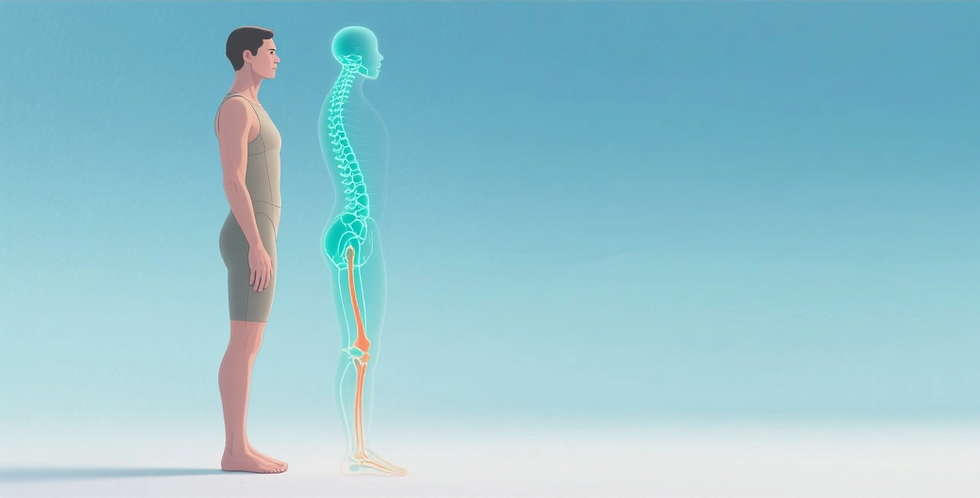The Fascia Highway: Understanding the Body’s Connective Tissue
- Luc

- Feb 15, 2025
- 4 min read
Updated: Feb 18, 2025
What Is Fascia and Why It Matters for Your Health
When it comes to health and wellness, most people focus on muscles, bones, and organs. Yet, there’s an overlooked system that plays a crucial role in how we move, feel, and function: fascia. This hidden network of connective tissue weaves through every part of the body, impacting movement, posture, pain, and even emotional well-being.
Understanding fascia is like discovering a hidden highway within your body—one that connects everything and influences your overall health. As a Human Coach, I have seen firsthand how improving fascia health transforms not only physical movement but also mental and emotional resilience. Let’s dive into what fascia is, why it matters, and how nurturing this incredible tissue can unlock holistic wellness.
What Is Fascia?
Fascia is a thin, fibrous connective tissue that surrounds and supports every muscle, bone, organ, and nerve in your body. Think of it as a three-dimensional web that holds everything together, providing structure, stability, and flexibility.
But fascia is not just a passive support system; it’s alive and dynamic. It is packed with sensory receptors and nerve endings, making it essential for how your body perceives movement, pain, and even emotions.

The Fascia Highway: Your Body’s Communication Network
Fascia acts as a communication superhighway, connecting different systems and ensuring they work in harmony. Here’s how it integrates key aspects of your health:
1. Muscles and Movement
Healthy fascia allows smooth, fluid movement by reducing friction between muscles. However, when fascia becomes tight or dehydrated, it can cause stiffness, pain, and limited mobility.
2. Organs and Internal Support
Fascia helps hold your organs in place and ensures their proper function. If fascia becomes restricted, it can lead to discomfort, dysfunction, and even digestive issues.
3. Nervous System and Sensory Input
Since fascia is rich in sensory receptors, it plays a significant role in how you perceive stress, pain, and movement. This is why emotional or physical stress often manifests as tightness, discomfort, or chronic pain in the body.
Why Fascia Health Matters
Healthy fascia is hydrated, flexible, and resilient, allowing your body to move freely and efficiently. However, fascia can become tight, dehydrated, or stuck due to:
Poor posture and sedentary habits
Repetitive movements and overuse
Chronic stress and emotional trauma
Lack of hydration and poor nutrition
When fascia isn’t functioning optimally, you may experience:
Chronic pain and stiffness
Postural imbalances
Reduced mobility and flexibility
Increased risk of injury
But fascia health isn’t just about the physical body. It’s deeply connected to mental and emotional well-being. Trauma, stress, and unresolved emotions often create tension in the fascia, contributing to persistent discomfort.
Fascia and Holistic Wellness
As a Human Coach, I take a holistic approach to health by recognizing the mind-body-emotion connection. Fascia is a perfect example of how our physical state influences our emotional and mental well-being. By working on fascia health, we can promote better movement, deeper emotional release, and greater mental clarity.
I guide clients to:
Reconnect with their bodies through mindful movement and fascia-friendly exercises.
Release tension and trauma stored in the fascia using techniques like myofascial release and somatic practices.
Enhance body awareness by improving posture, reducing stress, and making sustainable lifestyle shifts.
How to Start Supporting Your Fascia Health
The good news is, simple daily habits can nourish your fascia and transform your health. Here are a few steps to get started:
✅ Stay Hydrated
Fascia requires water to stay flexible and functional. Drink structured water (EZ water) and avoid dehydration to support optimal tissue health.
✅ Move Mindfully
Incorporate gentle, dynamic movements like yoga, stretching, or foam rolling to keep fascia supple and resilient.
✅ Release Tension
Try myofascial release techniques, such as using a foam roller or massage ball, to target tight or restricted areas.
✅ Align Your Posture
Poor posture can stress and stiffen your fascia. Explore Posture Alignment Therapy, POSTUREPRO Therapeutic Insoles, and Saccade Training (available in our store) to enhance proprioception, balance, and coordination.
✅ Harness the Power of Light and Water
Fascia is made of collagen, a semiconductor that relies on water and light for optimal function. Get morning sunlight, use red light therapy, and prioritize hydration to nourish your fascia.
✅ Manage Stress
Chronic stress can tighten fascia and disrupt its function. Incorporate deep breathing, meditation, and mindfulness to help your body relax and restore balance.
The Fascia Health Journey: Unlocking Holistic Wellness
This blog is just the first step in your journey to understanding and optimizing fascia health. In the upcoming series, "The Fascia Health Journey: Unlocking Holistic Wellness Through Light, Movement, and Connection," we’ll explore:
Fascia & Trauma: How stored emotions impact movement
Fascia & Movement: Sustainable practices for lifelong mobility
Fascia & Light: The role of natural light and red light therapy
Fascia & Water: Hydration and its impact on tissue health
Fascia & Sustainable Growth: Aligning movement with longevity
Together, we’ll uncover the secrets of this hidden highway and help you achieve a new level of vitality and wellness.
Call to Action: Start Your Fascia Health Journey Today
Are you ready to transform your health from the inside out? I invite you to schedule a 15-minute Healing & Growth Discovery Call with me. We’ll explore your unique needs and create a personalized plan to support your fascia, body, and overall well-being.
📅 Click below to book your 15-minute discovery call today!
Disclaimer
This blog is for informational purposes only and is not intended as medical advice. It is meant to complement other health and wellness methods, not replace professional medical care. By implementing the suggestions in this blog, you acknowledge that you do so voluntarily and take full responsibility for your health and well-being. Always consult a healthcare professional before starting a new health program or making lifestyle changes. All rights reserved.





Comments